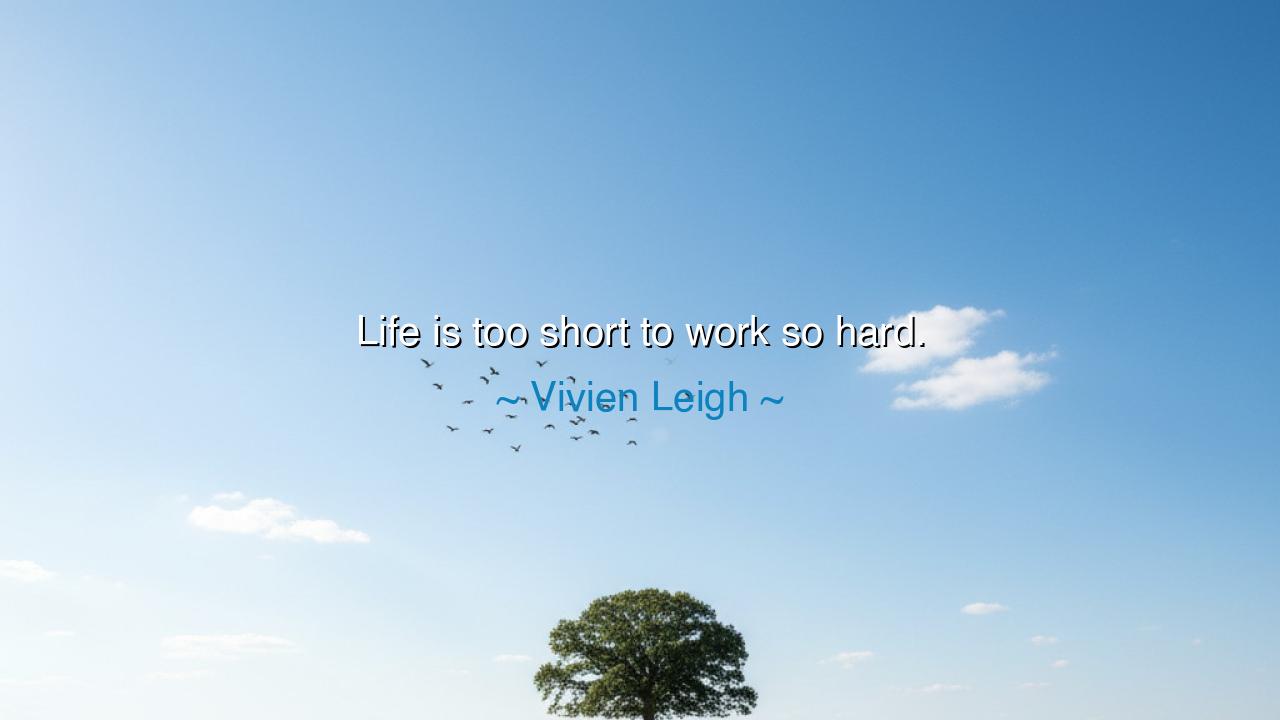
Life is too short to work so hard.






“Life is too short to work so hard.” Thus spoke Vivien Leigh, the radiant star of stage and screen, whose beauty and brilliance illuminated the world, yet whose spirit knew the cost of relentless striving. In these simple words, she offers not a command to idleness, but a cry of wisdom born from experience—a recognition that the brevity of life demands not endless labor, but balance, presence, and joy. Her words ring like a bell through the ages, calling us to remember that while work may sustain the body, it is the soul’s delight that sustains the heart.
Vivien Leigh, remembered by many as the immortal Scarlett O’Hara in Gone with the Wind, was no stranger to toil. Behind her fame lay years of exhaustion, illness, and the burden of perfection. She was a woman of immense discipline, whose craft demanded every ounce of her being. But the world, in its endless hunger for greatness, often forgets that even the brightest flame must rest. It was perhaps in her later years—after the applause had faded and the weight of life grew heavy—that she uttered this truth: that life’s sweetness is fleeting, and that to spend it consumed by ceaseless work is to miss the very reason we live.
When Leigh says that life is too short, she does not speak merely of time, but of essence. She reminds us that existence is delicate—a candle burning in the wind. Each moment wasted in blind toil, in chasing titles or wealth, is a petal lost from the bloom of our days. The ancients understood this well. The Roman poet Horace urged, carpe diem—“seize the day”—for time flies, and death waits for none. To work without joy, to labor without meaning, is to chain one’s spirit to the wheel of futility. Work is sacred, yes, but only when it serves life—not when it consumes it.
There is an ancient story of Diogenes, the philosopher who lived in simplicity. When Alexander the Great found him lying in the sun and asked what favor he could grant, Diogenes replied, “Stand out of my light.” The conqueror of nations stood in awe of this beggar’s peace. Diogenes worked not for crowns or gold, but for freedom of the soul. His life was his own, unburdened by the frenzy of ambition. In that moment, Alexander, despite his empire, saw who was truly rich. This is the spirit of Leigh’s words—the freedom to live fully, unchained from the tyranny of endless striving.
In our own age, where labor is worshiped and rest mistaken for weakness, Leigh’s wisdom strikes like lightning against the iron of habit. The world whispers that success is measured in hours worked, in ladders climbed, in wealth accumulated. But the heart, ancient and knowing, whispers another truth: that joy is the true measure of a life well lived. To work endlessly without love, without rest, without reflection, is to become a shadow of oneself. We were not born merely to produce, but to experience—to laugh, to love, to create, to behold the beauty that lies outside the walls of duty.
And yet, her words do not call us to abandon purpose, but to rediscover balance. There is dignity in labor, yes, but there is wisdom in knowing when to stop. Even the farmer must rest his fields, even the sun must set. Work should be the means to live, not the reason for living. To heed Leigh’s counsel is to remember that we are human, not machines—that our hearts need music, our minds need stillness, and our souls need wonder. A life of constant work may yield riches, but it cannot yield meaning.
So, my child of the modern storm, listen to her gentle command: slow down, and live. Do not let the years slip through your fingers like sand. Look up from your tasks, and see the sky. Speak to those you love, walk in the quiet, dream without guilt. Let your labor serve your joy, not steal it. For the clock is always ticking, and none can buy back a single breath once it is spent.
Thus, Vivien Leigh’s words echo like the wisdom of an oracle: “Life is too short to work so hard.” They are not a rejection of ambition, but a plea for awareness—for the courage to live deliberately, not mechanically. Let your work be noble, but let your living be sacred. The purpose of life is not endless toil, but the cultivation of wonder. Work, yes—but also rest, love, and marvel. For when the curtain falls and the lights dim, it is not the hours you worked that will matter, but the moments you truly lived.






AAdministratorAdministrator
Welcome, honored guests. Please leave a comment, we will respond soon